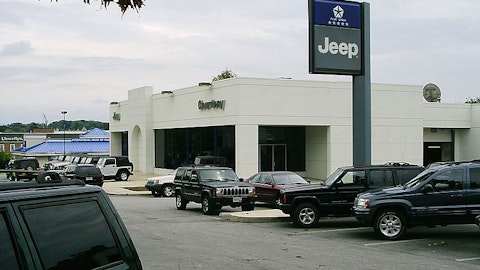Cango Inc. (NYSE:CANG) Q4 2023 Earnings Call Transcript March 12, 2024
Cango Inc. isn’t one of the 30 most popular stocks among hedge funds at the end of the third quarter (see the details here).
Operator: Good morning and good evening, everyone. Welcome to Cango Inc.’s Fourth Quarter and Fiscal Year 2023 Earnings Conference Call. At this time, all participants are in a listen-only mode. This call is also being broadcast live on the company’s IR website. Joining us today are Mr. Jiayuan Lin, Chief Executive Officer; and Mr. Yongyi Zhang, Chief Financial Officer of the company. Following management’s prepared remarks, we will conduct the Q&A session. Before we begin, I refer you to the Safe Harbor statement in the company’s earnings release, which also applies to the conference call today as management will be making forward-looking statements. With that said, I am now turning the call over to Mr. Jiayuan Lin, CEO of Cango. Please go ahead, sir.
Jiayuan Lin: [Foreign Language] Hello everyone and welcome to Cango’s fourth quarter 202 earnings call. 2023 proved to be a year of resilience in the face of headwinds. While a long-term economic recovery remained on the horizon, the confluence of domestic and international factors caused a temporary slowdown. This resulted in slower than anticipated growth and dampened consumer confidence. In the automotive sector, the traditional vehicle market contracted steadily, while new energy vehicles or NEVs experienced a surge in market share, sparking fierce competition within the segment. Price wars became a norm in the auto sales landscape triggering a necessary restructuring within the industry. This shift favored larger players and accelerated a survival of the fittest scenario.
Dealerships, particularly smaller ones in lower-tier markets faced significant operational challenges, especially in the latter half of the year. Despite a challenging market environment in 2023, Cango delivered total revenue of RMB130 million in Q4 and RMB1.7 billion for the full year. The company strategically reduced its total outstanding financing balance of facilitated-financing transactions to approximately RMB10 billion by year-end. Our quarterly metrics remain stable with M1+ and M3+ delinquency rates at 2.66% and 1.37%, respectively, reducing our risk disposure further. And to mitigate this dynamic market, Cango implemented strict cost reduction measures and efficiency enhancements, successfully lowering operating expenses. Notably, Cango maintains a solid financial position backed by robust liquidity and ample cash reserves.
As of December 31st, 2023, the company posted RMB3.33 billion in cash, cash equivalents, and showed an investment as well as restricted cash, that is bank deposits held for shortened investments. This strong financial foundation provides a springboard for the sustainable growth of our existing businesses and fuels our exploration of new ventures. To adapt to evolving market conditions and capitalize on industry trends, we took proactive steps to streamline our operations. This included clearing our new car inventory and consolidating our platforms into a single powerful solution. In Q4, we successfully merged our new car platform, Cango Haoche into Cango U-Car, our used car platform. This strategic move optimizes resource allocation and boosts operational efficiency.
The upgraded Cango U-Car app now functions as comprehensive online marketplace. It connects upstream vehicle suppliers, aftermarket service providers, and downstream more dealers in lower-tier cities. This integrated platform offers users a full suite of services throughout the used car transaction process, catering to three main scenarios that is online auctions, dealer-to-dealer transactions, and broker-assisted deals. Cango U-Car goes beyond facilitating transactions. We provide a robust ecosystem of services, this includes access to historical vehicle reports, vehicle evaluation and inspection, logistics and delivery, insurance solutions, and supply chain financing. Our revenue streams will primarily come from upstream store rentals, membership subscriptions, and transaction-related service fees.
We streamlined operations within the integrated Cango U-Car platform in Q4. This included the introduction of a fixed price end-to-end transaction service for cross-regional used car purchases with innovative service, simplified and secure long distance transactions by offering price verification, vehicle inspection, guarantees, and delivery services. By Q4, 38 upstream third-party sellers have set up stores on Cango U-Car, offering a comprehensive collection of vehicles, including new and used cars, along with traffic generation services. By leveraging our expertise in sales funnel management, we identified 9,887 potential business leads in Q4. We successfully converted a significant portion of leads, providing services to 3,499 online small dealers and facilitating 530 used car transactions.
Besides attracting third-party services, we are also maximizing engagement and exploring new opportunities through our self-operated stores. These stores offer a diverse range of services in four key areas; first, they repossess car management. We handle repossessed vehicles, primarily sourced from our auto financing business and collaborations with other lenders. Secondly, C2B lead conversion. We transformed individual customer leads into tradable assets, facilitating transactions between them and dealers on our platform. We initially focused on existing financing customers, but now we have expanded lead sources in Q4 to boost conversion rates. Thirdly, B2B transaction facilitation, we provide transactional logistic support for small dealer-to-dealer sales.
And fourthly, we have expanded our insurance services. Our insurance teams offers comprehensive coverage, including auto insurance and as of Q4, non-auto options like work injury and work insurance for key regional clients. At Cango U-Car, we understand superior user experience hinges on the strong technological foundation. In Q4, we deployed a central AI platform, leveraging our digital expertise to optimize resource matching for vehicle inventory, customer leads, and auto financing. This powerful tool, combined with our standardized streamlined and intelligent transaction services, aims to create a nationwide network for efficient used car circulation. Furthermore, we remain dedicated to empowering small dealerships. We offer services that help them reduce operating costs and diversify revenue streams, especially during challenging market conditions.
Ultimately, our goal is to enhance their survival rates and overall success. Cango’s vision remains steadfast to become an industry leader by continuously refining and offering top-notch services and products across the entire automotive value chain. Cango U-Car’s online marketplace is just one [Indiscernible] of our growth strategy. We see significant potential in China’s burgeoning used car export market, unlike the fierce competition within the domestic market. China, as the world’s largest auto manufacturer and consumer, possesses a vast pool of used cars, a gold mine for exporters. Additionally, government policies are fostering a more transparent regulated used car market. This translates into higher quality and more reliable vehicles that are competitive internationally.

Furthermore, China’s robust auto manufacturing and parts supply chain keep used car prices competitive globally, leveraging its position as the top international trading nation, China does a well-developed logistics network, ensuring efficient and secure delivery of used cars to international buyers. China’s position as the world’s leading auto exporter with over 5 million vehicles shipped in 2023 on a projected upward trend, presents a compelling opportunity for the used car export market. Recognizing this potential, Cango is actively pursuing this exciting new venture. Leveraging our extensive experienced network within China’s domestic auto market, combined with the advantage of being a U.S.-listed company, which brings us access to capital and broader market reach, we’ve launched a comprehensive used car information exchange and export service platform.
This platform, integrating both online and offline resources, cater specifically to auto dealers in emerging and developing countries. By partnering with Cango, these international dealers gain easy access to China’s vast pool of used vehicles, a significant advantage in today’s global market. AutoCango, our cross-border used car information exchange platform, or www.autocango.com was launched in early March 2024 with earnings prices inventory exceeded 75,000 SKUs. This platform is constantly growing with approximately 500 to 1,000 new vehicles added weekly. Leveraging cutting edge AI technology, AutoCango empowers users with an intuitive search experience, making it easier than ever to find the perfect car. Furthermore, our platform prioritizes user interaction, ensuring it caters to each customer’s evolving needs.
Transparency, efficiency, and security are at the core of AutoCango. We are committed to providing a seamless and secure experience for all users, with the ultimate goal of becoming a go-to platform for overseas buyers, seeking high-quality used cars from China. While acknowledging the current market complexities, we remain bullish on the long-term potential of China’s auto industry and the strength of Cango’s end-to-end service model. In 2024, we are committed to solidifying our position within the auto transaction market, pioneering digital innovation, and leveraging AI to enhance our platform and user experience, as well as expanding our offerings by introducing new products and services across the entire value chain. By working along with our dealer partners, these initiatives will allow us to create significant value and become a key player in China’s dynamic technology-driven automotive landscape.
Now, I’ll hand over to our Chief Financial Officer, Michael Zhang, for a review of the company’s financial performance.
Yongyi Zhang: Thanks Jiayuan. Hello everyone and welcome to our fourth quarter and full year 2023 earnings call. Before I start to review our financials, please note that unless otherwise stated, all numbers are in RMB terms and all percentage comparisons are on a year-over-year basis. Total revenue in the fourth quarter of 2023 were RMB130.2 million compared with RMB487.1 million in the same period 2022. Guarantee income, which represents the fee income earned on a non-contingent aspect of a guarantee, was RMB42.1 million in the fourth quarter. Now, let’s move on to our cost and expenses during the quarter. Total operating costs and expenses in the fourth quarter of 2023 were RMB159.1 million compared with RMB698.7 million in the same period 2022.
Cost and revenue in the fourth quarter decreased to RMB110.9 million from RMB481.7 million in the same period 2022. As a percentage of total revenues, cost of revenue in the fourth quarter of 2023 was 85.1% compared with 98.9% in the same period 2022. Sales and marketing expenses in the fourth quarter decreased to RMB4.4 million from RMB19.2 million in the same period in 2022. As a percentage of total revenues, sales and marketing expenses in the fourth quarter 2023 were 3.4% compared with 4% in the same period 2022. General and administrative expenses in the fourth quarter decreased to RMB45.6 million from RMB66.2 million in the same period 2022. As a percentage of total revenues, general and administrative expense in fourth quarter 2023 were 35% compared with 13.6% in the same period 2022.
Research and development expenses in fourth quarter decreased to RMB7.3 million from RMB8.4 million in the same period in 2022. As a percentage of total revenues, research and development expenses in fourth quarter 2023 were 5.6% compared with 1.7% in the same period 2022. Net loss on contingent risk assurance liability in the fourth quarter were RMB22.2 million. Net recovery on provisions for credit losses in the fourth quarter were RMB31.2 million. The recovery was primarily due to the positive impact of collections of financing receivables. We recorded RMB28.9 million in loss from operations in the fourth quarter of 2023 compared with RMB211.6 million in the same period 2022. Net loss in the fourth quarter was RMB103.8 million. Non-GAAP adjusted net loss in the fourth quarter was RMB99.2 million.
On a per share basis, basic and diluted net loss per ADS in the fourth quarter of 2023 were both RMB0.95 respectively and non-GAAP adjusted basic and diluted net loss per ADS in the same period were both RMB0.91 respectively. For the full year of 2023, our total net revenue were RMB1.7 billion, total operating costs and expenses were RMB1.8 billion, net loss was RMB37.9 million, and non-GAAP adjusted net income was RMB0.6 million. Basic and diluted net loss per ADS were both RMB0.31, non-GAAP adjusted basic net income per ADS was RMB0.01 and non-GAAP adjusted diluted net income was RMB0, respectively. Moving on to our balance sheet. As of December 31st, 2023, the company had cash and cash equivalents of RMB1 billion compared with RMB665.6 million as of September 30th, 2023.
As of December 31st, 2023, the company had a short-term investment of RMB635.1 million, while the company had restricted cash. Current bank deposit held for short-term investment of RMB1.7 billion. As of September 30th, 2023, the company had a short-term investment of RMB2.4 billion. Looking ahead to the first quarter of 2024, we are now predicting our total revenues to be between RMB50 million and RMB100 million. Please note that this forecast reflects our current and preliminary view on the market and operating — operational conditions, which are subject to change. This concludes our prepared remarks. Operator, we are now ready to take questions.
See also 13 Most Advanced Countries in Logistics and 20 Most Popular Religions in the World.
Q&A Session
Follow Cango Inc. (NYSE:CANG)
Follow Cango Inc. (NYSE:CANG)
Receive real-time insider trading and news alerts
Operator: Thank you. [Operator Instructions] Your first question comes from Pingyue Wu from Citic Securities. Please go ahead. Pingyue Wu, your line is now live. Thank you. Your next question comes from Emerson Zhou [ph] from Goldman Sachs. Please go ahead.
Unidentified Analyst: [Foreign Language] Thank you. I’m Emerson from Goldman Sachs. I have three questions. First question, we noticed that the company has entered a strategic partnership with Caocao Mobility. Can the management share some details on these progress? And second question is that we noticed the company currently holds a substantial cash position, while the company issue dividends — distribute dividends. And my third question is what are the differences in Cango U-Car before and after integration?
Jiayuan Lin: [Foreign Language] Thank you, Emerson for your questions. The first question, while Caocao Mobility is a leading domestic shared mobility platform, it provides users with smarter, greener, and healthier travel experiences and Cango is a powerhouse in automotive trading and aftermarket services. Our extensive network and vast vehicle inventory will enable us to jointly pursue business opportunities in China’s high-growth, lower-tier markets. Currently, IT teams from both parties are working together on the back-end system and program development. We will provide regular updates to keep everyone in front of the latest developments as they unfold. On your second question, since going public, we’ve established a track record of rewarding shareholders with consistent dividends to further solidify confidence in Cango’s long-term growth trajectory.
For further dividend plans, we will maintain a prudent approach, carefully considering factors like overall strategic plans, business developments, and our cash flow position to ensure a sustainable dividend policy. On your third question, prior to integration, Cango U-Car functions as a stand-alone platform dedicated to used car transactions. This included sourcing vehicles, facilitating car purchase, and hosting online auctions. Following the integration, Cango U-Car has evolved beyond the used car platform in our both the comprehensive marketplace, featuring third-party sellers offering new car sales, insurance, and traffic generation services. We are committed to continue expanding this ecosystem by integrating even more third-party vendors, fostering a more dynamic and enriching user experience.
Thank you.
Operator: Thank you. Your next question comes from Pingyue Wu from Citic Securities. Please go ahead.
Pingyue Wu: [Foreign Language] I’m Pingyue from Citic Securities. I have two questions. The first question is, could management share your insights for 2023 automotive market and provide outlook for 2024? My second question is on the used car export business, what about the progress? And has the company considered working with some KOLs?
Jiayuan Lin: [Foreign Language] Thank you for your questions. On your first question, despite the sluggish start in 2023, the automotive market accelerated towards the latter part of the year and into early 2024. This momentum was built by a series of promotional activities launched by car manufacturers. We anticipate these price reductions to persist for some time. However, the intense competition within the industry has resulted in margin pressure for various players throughout the supply chain. 2024 outlook, NEV penetration rate has been surging over the years and rose from 28% in 2022 to 35% in 2023 and is expected to reach 40% by 2024. This rapid shift is intensifying competition within the NEV segment as well as the conventional fuel vehicle segment.
While traditional gasoline-powered vehicles remain profitable, their market share is contracting rapidly. NEVs are experiencing robust sales growth, while manufacturers are currently absorbing significant losses. So, these contrasting dynamic presents substantial pressure on the overall market. On your second question, our used car export business. In March 2024, we launched AutoCango, the first of its kind cross-border information exchange platform for used car market. AutoCango bridges the gap in information services by connecting domestic Chinese used car dealers with foreign buyers, specifically targeting auto dealers in left-hand drive markets across emerging economies. Leveraging China’s position as the world’s largest auto market, AutoCango empowers its international buyers with easy access to a vast pool of quality used cars.
Powered by innovative AI technology, our platform streamlines the user experience, enhancing vehicle discovery, search efficiency, and user interaction to precisely meet evolving customer needs. AutoCango prioritizes transparency, efficiency, and securities throughout the entire transaction process, ensuring a smooth and secure experience for all parties involved. On partnerships, we are open to partnership opportunities that align with the following criteria; firstly, profitability. We prioritize ventures with clear business models and transparent cost structures. And secondly, long-term growth potential. However, to ensure efficient resource allocation, we conduct regular assessments within defined time frames. Thank you.
Operator: Thank you. We have no further questions at this time. I will now hand the call back to management for closing remarks.
Jiayuan Lin: [Foreign Language] Thank you all for your participation. That closes today’s earnings call.
Follow Cango Inc. (NYSE:CANG)
Follow Cango Inc. (NYSE:CANG)
Receive real-time insider trading and news alerts




